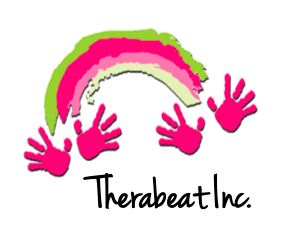Rationale and Support for 3 Behavioral Approaches within Music Therapy
Music therapists (MT-BCs) who work with children, youth, and young adults use music-based interventions to address specific behaviors. Behavior, as defined by the American Psychological Association (2020), is “an organism’s activities in response to external or internal stimuli, including objectively observable activities, introspectively observable activities, and nonconscious processes” (2020). Below is rationale and support for three different MT philosophical approaches and their corresponding strategies that address behavior of children and youth.
The Cognitive Behavioral Theory (CBT) approach is centered around the belief that how we think, how we feel, and how we act are all interrelated. Our thoughts and feelings determine our behavior, which in turn, determines our thoughts and feelings. The CBT model looks like this:
(McLeod, 2019).
Practicing MT-BCs who are trained and influenced by CBT help clients realize that their positive, uplifting thoughts can bring about more positive outcomes, while their negative, self-destructive thought patterns bring about more upsetting outcomes. Negative interpretations of events influence behavioral patterns which reinforce distorted thinking (McLeod, 2019).. In turn, positive interpretations of events influence behavioral patterns which reinforce healthy thinking. Cognitive-behavioral therapy helps people to develop alternative ways of thinking and behaving which aim to reduce their psychological distress. One strategy often used by cognitive behavioral therapists is assigning “homework” for clients, such as keeping a journal of thoughts, or noting how many times a particular negative thought enters their minds each day. Through increased self awareness, behavior can begin to change. MT-BCs use music, which is reality-based and structured, to increase self-awareness of thoughts, bring attention to emotional content, and more. MT-BCs can also assign “homework,” such as journaling about thoughts which can be used in song-writing during the next session, assigned listening to preferred music and bringing specific lines or full songs to discuss in a lyric analysis intervention. Music-based interventions and intentional verbal processing, related to the music intervention, are used to guide the client to a state of self awareness or identification of emotion and its corresponding behavior.
Similar to Cognitive-Behavioral Theory is Dialectical Behavior Therapy, or DBT. “Its main goals are to teach people how to live in the moment, develop healthy ways to cope with stress, regulate their emotions, and improve their relationships with others” (Schimelpfening, 2021, paragraph 1). DBT strategies are used in group therapy and individual therapy sessions. Common strategies used by DBT therapists are core mindfulness skill development, distress tolerance skill development, interpersonal effectiveness, and emotional regulation strategies. DBT provides clients with the opportunity to develop skills to improve their quality of life. In 2015, Chwalek and colleagues interviewed MT-BCs who were using DBT and concluded that, though few, MT-BCs valued and saw the benefit of DBT strategies within therapy. MT-BCs provide music-based interventions that in their nature address self-esteem, mindfulness, improving social skills, increasing self-confidence, building stress tolerance, improving communication skills, and learning positive peer interactions (Chwalek, 2015, p.297).
Person-centered therapy, or humanistic therapy, was developed by Carl Rogers in the 1940s. A person-centered therapist is authentic, provides the client with genuine empathy, and unconditional positive regard (Unknown, 2018, paragraph 3). Music can be uniquely used in a person-centered fashion when the therapist is working from a person-centered approach. For example, a person-centered intervention may include allowing the patient to write their own lyrics, discuss lyrics, or improvise melodies in a way that affirms and accepts their experience with no attempt to correct or judge the client. Music is a non-threatening and non-verbal form of building relationships, communication, and interpersonal connection, so it has inherent qualities appropriate for the person-centered approach. In 2015, McCaffrey and Edwards interviewed six psychiatric patients, all who had participated in MT sessions, about their experience. The most common theme that appeared in the interviews was that in its nature, MT is person-centered. According to participant L, one-on-one MT sessions provided “a space in which he feels acknowledged as a unique and individual person” (McCaffrey, p.129). Within MT sessions there is often opportunity for autonomy, choice, and expression of individual wants or needs. In many cases, expressing wants and responding to opportunities of binary choices, is an objective or goal set by the treating MT-BC. In their interview, participant L stated that “in the music therapy environment, choice, direction, and leadership were encouraged by his therapist” (McCaffrey, p.130), which was similar to the experience of other participants in the study.
MT-BCs can use music to address behaviors, improve behaviors, increase self-efficacy, improve self-esteem, and more by presenting interventions with additional background in CBT, DBT, and person-centered psychological approaches. Those who specialize in and work with children or youth may be influenced by one or more than one of the psychological orientations and strategies discussed above.
-Kathryn Trujillo, Music Therapy Intern
References:
APA Dictionary of Psychology. (2020). American Psychological Association. https://dictionary.apa.org/behavior
Chwalek, C., & McKinney, C. (2015). The use of dialectical behavior therapy in music therapy: A sequential explanatory study. Journal of Music Therapy, 52(2), p.282-318, https://doi.org/10.1093/jmt/thv002
McCaffrey, T., & Edwards, J. (2016). Music therapy helped me get back doing: Perspectives of music therapy participants in mental health services. Journal of Music Therapy, 53(2), p.121–148, doi:10.1093/jmt/thw002
McLeod, S. A. (2019). Cognitive behavioral therapy. Simply Psychology. https://www.simplypsychology.org/cognitive-therapy.html
Schimelpfening, N. (2021, July 9). What is dialectical behavior therapy (DBT)? Verywell Mind. https://www.verywellmind.com/dialectical-behavior-therapy-1067402
Unknown. (2018). Person-centered therapy (Rogerian therapy). Good Therapy. https://www.goodtherapy.org/learn-about-therapy/types/person-centered

